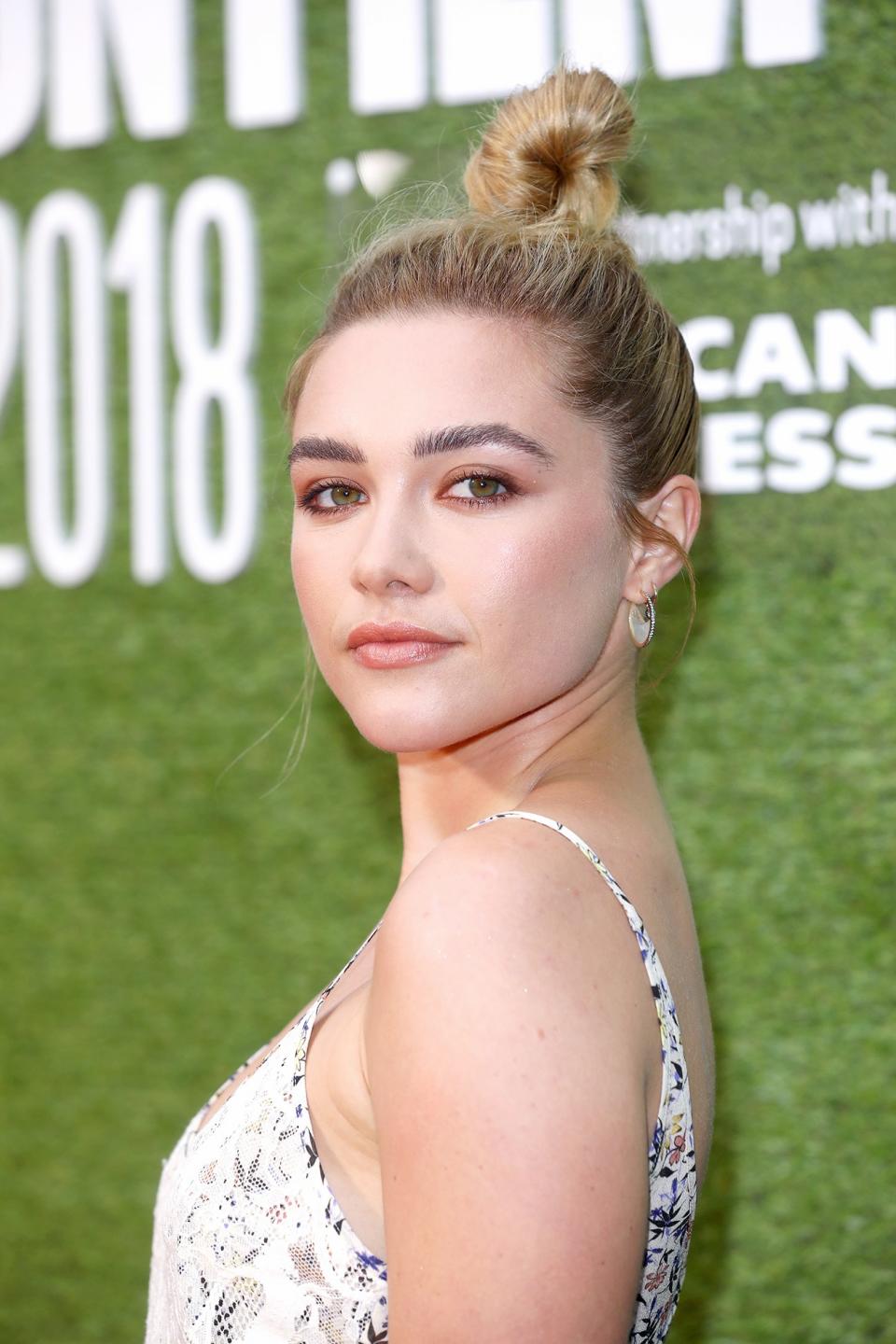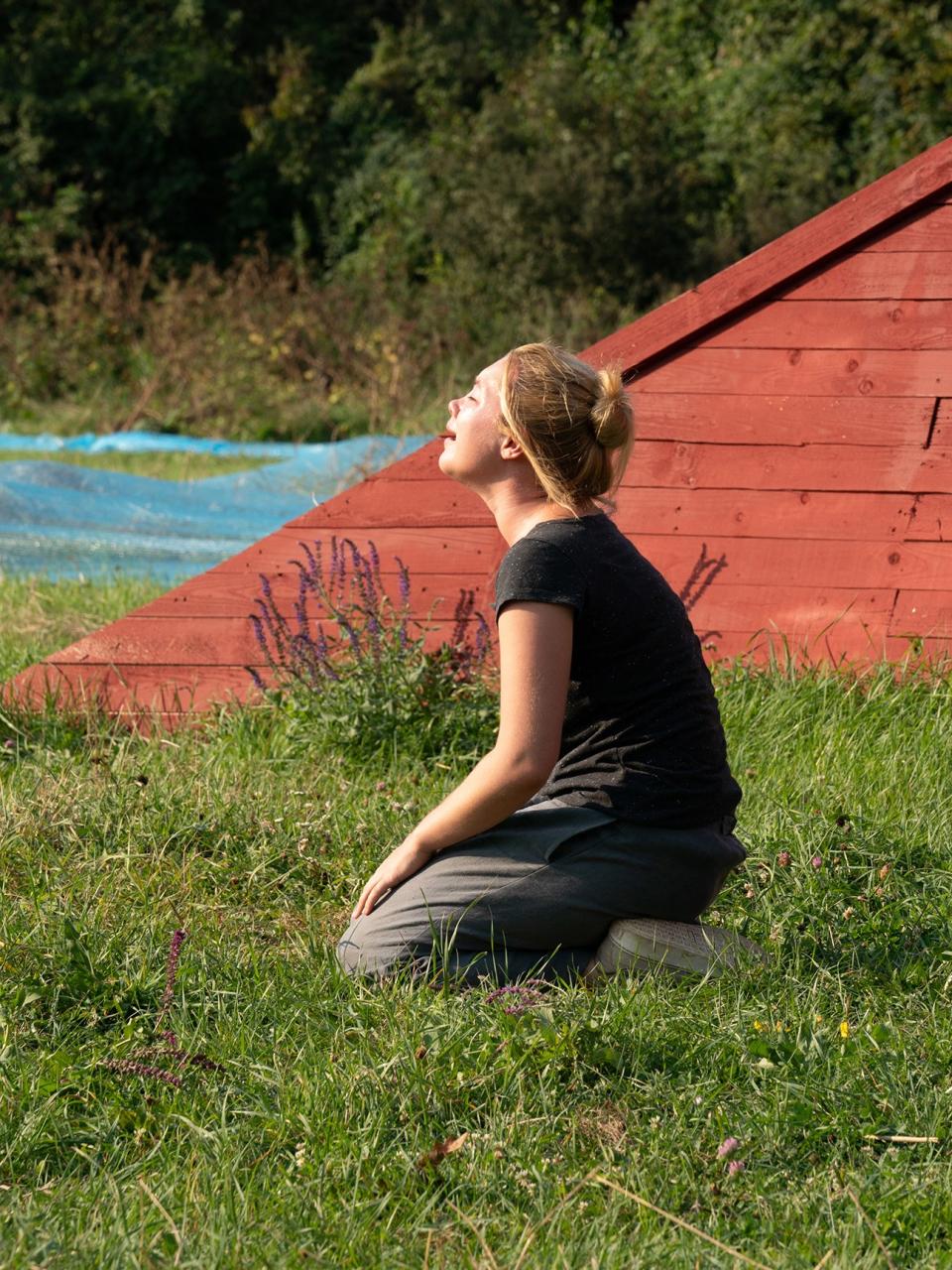How the Midsommar Team Made the Year's Most Traumatic Movie
If you hadn’t heard by now, Midsommar is a pretty hardcore movie for something that writer/director Ari Aster insists is a “fairytale.” Creatively morbid murder/suicides, ritual killings, and forced hallucinations are just the tip of the iceberg when it comes to Midsommar’s macabre bag of tricks.
The sun-soaked Eden of Hälsingland—brightly-colored barns and flowers underfoot—belies the brutality bubbling under the surface in the home of the Hårga, and the tone of the film itself. Turns out, a lot of blood, sweat, and tears goes into making a movie this daunting and this beautiful. GQ spoke to Aster and Midsommar’s breakout star, Florence Pugh, about the grueling challenge of making the movie, unpacking some of the film’s more pressing questions, and just what we should be taking away from that jarring, triumphant, horrible ending. Spoilers ahead, naturally.
GQ: Ari, if I’m not mistaken, this film came together at the very last minute. I was in a screening at 10 a.m. on Monday morning, and was told the film had been hand-delivered at 4 the previous evening.
Ari Aster: Tomorrow I'm making final changes and polishing stuff further, and then it's pencils down. I haven't even really made peace with what the movie is right now. It feels like a grieving process for me, where you're going for something, and you get close, but you want to get closer, but you've got to move on. And so you grieve. I'm always grieving what we didn't quite get, which you can't ever really get. It's always very painful for me. And then, by the end, your memories of what you wanted fade away, and they're replaced by what the film is, and you can see what you've done. But, for me, I'm not even quite there with Hereditary. And so, it'll be a while before I can see what Midsommar actually is.
When do you think you're going to be able to sit down and watch Hereditary like a movie?
Aster: Maybe five years from now. I have fond memories of what we did, but whenever I watch it, I'm just crippled by my critical eye, and seeing how we could've done that better, and wishing I got one more take, so we could've massaged a certain moment. It's all aimed directly at myself. I'm always very proud of the work that the people on my team have done.
Florence, where are you in the Midsommar grieving process?
Florence Pugh: I don't know. I'm processing it. I'm kind of like waiting for all of this [the press tour] to be over and then I'll start thinking about it. It's odd. It was odd making it.
How so?
Pugh: It was exhausting. It was just… I mean, imagine making that. The content we were doing was sensitive and tricky and tiring. It was emotionally wrecking my mind and body and soul. On top of that, we were filming in really hot, hot, hot conditions. We're in a field for three months and as Jack [Reynor] says, we were working with three different languages and everything had to get translated in three different sessions, and no one spoke all three languages. So just simple things like that, communication, location, it's tricky with one of the hardest stories to understand how to perform.

1052125096
Tim P. Whitby/Getty ImagesAri, how did you know Florence was the actor for Dani? It’s a role that asks so much of an actor. She experiences pretty much every emotional extreme in the course of the film.
Aster: A lot of great actresses were trying out for it. There were so many women who could've done such an amazing job that we were thinking about, but Florence was always at the top of the list. There's a lot of me in that character.
Is that daunting as an actor, Florence?
Pugh: Yeah, Dani is based on him, but when you cast someone in a role, you have to trust that they are going to want to do something with it as well, and we had to meet in the middle. I don't feel embarrassed about saying that. I have to respect that this is his writing and he knows exactly how he wants it to be, and I think he knew that he had to respect that he cast me for a reason. And if you take on a character you have to feel like it's part of you as well.
It's tricky at times. I would have a reasons as to why I wanted to play a certain beat, and he would say, “Well, that's not how I...” You know? There's always going to be complications.
But because he does see Dani as himself it was actually sometimes a really nice and useful thing, because I would think, “Oh, I get it. That's why she's like this and that's why he wanted to say that,” Sometimes I know how Ari thinks. Sometimes. I know how Ari works and I know how he will beat himself up about certain things and we then as a cast and we then as the actors of the story have to say, “No, it's totally fine. You're fine. This is okay. This isn't a problem. We can all collaborate and we can help one another.”
This certainly seems like the kind of film where you would have to help one another.
Pugh: All the actors, at the end of the day we'd all get on the bus home and we'd have a beer and we'd make sure that we checked in with one another. Everybody works in different ways, but, this film, it's self abuse in some way, like you're putting yourself through that, and it's very easy to not want to talk about it. So we made sure that every day we would check in and it wasn't even a thing that we would tell ourselves to do, it was just obvious. We were all going through this nightmare and that is the only thing we could help one another with. I think if I had just finished and gone back to normal life without that security, I think that would have been far more alarming.
Was Ari part of that checking in, or was he just your horrible puppet master?
Pugh: Ari was going through his own hell. He was directing a film and making sure that it was perfect and working in three languages, so we weren't upset that he was on his own, trying to figure out his own stuff.

I loved Dani’s horrid relationship with Christian. These guys have a full history and you're coming into them right at the end of their relationship, and you've got to essentially play two separate characters: the people talking to each other and then the people who are thinking the stuff that they're not saying.
Pugh: Well, isn't that relationships? That's why it's so sad and tiring to watch these two on screen: they don't say anything and when they do it's so pathetic and small. But they sure as hell let one another know that they're unhappy in the eyes, and that's what a relationship is... It's so frustrating, and you just get angry at Dani for not talking and for not saying, “God, you're such a shit to me.” And then you get angry at him for not being like, “God, you're not helping me,” and that's what was so exciting and fun to play with him.
Aster: Jack and Florence have great chemistry, but because they get along so well in real life, the tricky part becomes, how do you ... throw that chemistry off? So, suggest that these people have known each other for several years, and been intimate for several years, but at the same time, they're in a place where they're just not meeting.
Pugh: I feel that in films, you get relationships where you're angry at one another and where one another's cheated or where you're like totally in love, but you never get that middle patch which is like, “Ugh, God there's nothing there anymore but history,” and that is so sad.
Let’s talk about the ending to the movie. Ari, is there any way any of these Americans were getting out of the village, even if they hadn’t transgressed?
Aster: No. This is certainly ... Everything is planned out. I will say, they are extremely conniving people, but at the same time, I'm hoping that their way of life, and even just their... approach to life is more attractive than what the Americans are bringing. I see Midsommar as a perverse, wishful film and fantasy. It's a fairytale, and there's this warped suggestion of happily ever after.
Florence, do you think it's a happy ending?
Pugh: I don't know. A few scenes before, you clearly saw that she wasn't there anymore and that she'd had a psychotic break, and you could distinctly notice that she was gone. Which made all of the decisions that happened in the last ten minutes even more heartbreaking because you knew that she wasn't really making them. And so the ending of the film, for me made it easier because I knew that she wasn't there. I actually played her as a child in a lot of the scenes at the end, some of which got cut. I wanted her to be excited by the fire, I wanted her to be excited by the cracks and the blazes and the color of the sky and that was something that I was channeling.
But now that those scenes are gone, it's quite interesting to see how people will perceive that she's been twisted or if maybe she's made that decision.
So I don't know if it's a happy ending. I've thought about it since and… [Long pause] In all the other characters that I've played I've never worried about them afterwards. I always let go of my characters. I don't carry them. Dani is the only one that I've come back to and I've felt really sad, and I felt like I let her down. I feel like I've left her in that field.
Originally Appeared on GQ

